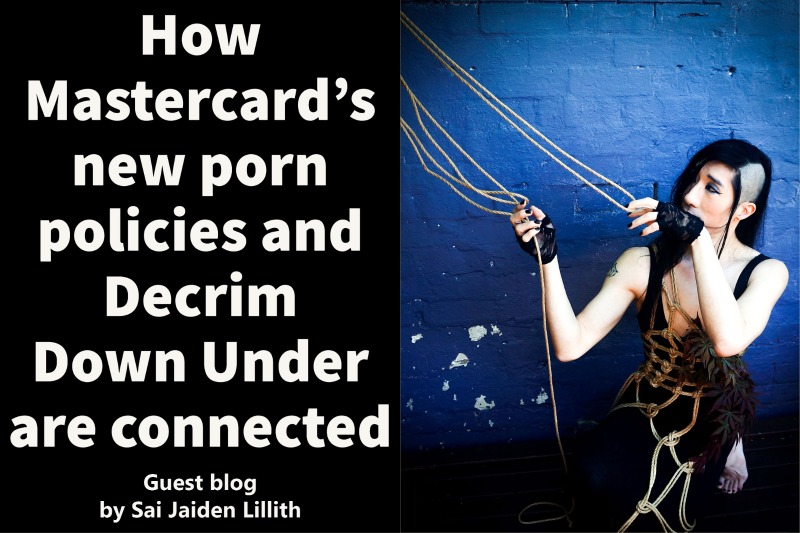Exploring decriminalisation and destigmatisation of Sex work as a Global Movement – A guest blog from Sai Jaiden Lillith.
A very short summary of recent events
On October 15 2021, Mastercard’s Revised Standards around Adult Content providers comes into effect, with the potential for dire consequences for the Adult industry. These standards were developed with little to no consultation with the Adult industry, instead the standards were drafted over months of negotiation with anti-sex religious organisations such as Exodus Cry and NCOSE. This is not the first time that Mastercard has been involved in deplatforming sex workers or making decisions which remove our ability to earn an income (Backpage, PornHub, OnlyFans to name a few).
On August 13 2021, the Victorian Government announced that it was committing to the full Decrminalisation of sex work including the implementation of robust Anti-discrimination laws for sex workers. This is a win for the validation of erotic expression and the recognition of sex work as consensual, legal and of value to society.
On September 1 2021, a worldwide protest against discrimination by banks, payment processors and social media against sex workers will take place.
On June 23 2021, the Australian Government passed the Online Safety Bill, a piece of legislation promoted as protection against cyberbullying and “protecting the children”. In reality, due to the vast powers granted to an unelected official with little to no oversight the OSB has the potential to gravely impact sex workers in Australia and the LGBT community, curtail open discussions of sexuality and sex related issues online and prevent free erotic expression by individuals. Members of the legal profession and digital and human rights groups expressed grave concerns about the structure and content of the bill; however their concerns were ignored and the Bill passed with little amendment. The ESafety Commissioner claimed that they weren’t going to make decisions which would impact sex workers, but within the Bill was a directive to create new systems to restrict adult content. You can read my detailed submission to the government here.
How are these events linked?

Pressure from anti-sex organisations will stifle online expression
Mastercard and other financial institutions are being manipulated and pressured by anti-sex / anti-pornography groups such as Exodus Cry and Laila Mickelwait into withdrawing their processing support from adult sites OR putting into place policies which will effectively cripple the adult industry. They’re now trying to cover themselves against legal liability in introducing regulations which will stifle the freedom of erotic expression online.
The new standards enforced by Mastercard have the potential to gut the adult industry which is already reeling from FOSTA SESTA, the Backpage shutdown, the PornHub payment processor withdrawal and the recent OnlyFans debacle, whilst doing nothing to stop CSAM and sex trafficking. In fact, these decisions are being driven by organisations whose stated aim is to end ALL commercial sex industries, including in-person sex work of all kinds. NCOSE is also behind such campaigns as the one to have Cosmopolitan removed from Walmart, AND the founder of Exodus Cry is a proud homophobe.
Do you want conservative and religious-based organisations making decisions that affect us globally?
The impact of anti-porn campaigning on marginalised communities and micro-businesses in Australia
The new standards will adversely affect POC, LGBTQ communities, independent ethical porn sites and those most vulnerable in our communities, and have flow on effects for all sex workers.
Sex workers are unfairly discriminated against by banks, by real estates, by employers, by the community – we’ve been prevented from getting housing, had our accounts closed, denied employment, and been the subject of violence that has nothing to do with what happens in our work – and everything to do with the stigma AROUND our work.
Anti-sex organisations have been around for a long time. Globalisation and the internet have given these unelected officials the reach to make sweeping changes worldwide which affect the livelihood of millions, as well as shaping the future of how we can express ourselves online.
These changes WILL affect Australians. These changes WILL unfairly discriminate against Australian sex workers.
WHAT’S WRONG WITH MASTERCARD’S NEW POLICIES?
Mastercard’s new standards are problematic in a number of ways.
“1. The Merchant must not market the content of its website or permit content search terms to give the impression that the content contains child exploitation materials or the depiction of nonconsensual activities.”
The important phrase here is “to give the impression“. That is a very vague phrasing that allows all kinds of interpretations and discriminations. Just a quick few examples that pop into my head:
- Unfair discrimination against sex workers who have small breasts, or slight frames as this could “give the impression of child exploitation materials” – which can also discriminate unfairly racially as Asians typically have smaller frames than other nationalities.
- Consensual kink often gives the impression of non-consent, but as a professional BDSM provider and consenting adults, we all know that fantasies of non-consensual scenarios are a huge part of our erotic blueprint. Yes, this applies to all genders. This term effectively removes a huge amount of consensual power exchange fantasies from being legally provided, or promoted.
- Certain facial and vocal expressions of sexual pleasure can give the impression of non-consent
- A LACK of facial / vocal expressions of sufficient enthusiasm can also give the impression of non-consent – which can create an expectation of a homogenized range of acceptable sexual expressions online
You can see here how this ONE new standard is open to abuse.
“6. The Merchant must have effective policies in place that prohibit the use of its website in any way that promotes or facilitates human trafficking, sex trafficking or physical abuse. Active membership and participation in an anti-human trafficking and/or anti-child exploitation organization is highly recommended.”
Firstly, “prohibit the use of it’s website that promotes or facilitates… sex trafficking” is especially relevant to in-person sex workers who are also content creators.
The consequences of FOSTA SESTA laws showed that the US and many other governments around the world conflate consensual sex work with sex trafficking. This doesn’t always happen by accident: “We decided we wouldn’t make a distinction between women who are coerced and [women] who choose. If you try to make that distinction, you will get nowhere when focusing on demand.” – Julie Bindel, British Journalist, researcher, and feminist campaigner
This conflation can, and does see people who are identifiable as in-person sex workers removed from content platforms such as OnlyFans because it’s seen as promoting… sex trafficking. This unfairly discriminates against content producers who are ALSO sex workers, such as myself. Especially in a COVID pandemic and lockdowns which has seen the ability to survive doing in person sex-work markedly diminshed, pivoting to online work has enabled many of us to bridge the gap, and to continue to remain housed and feed our families.
“prohibit the use of its website in any way that promotes or facilitates… physical abuse.”
This covers a vast number of consensual BDSM activities that could be argued as physical abuse by the ignorant & puritanical. A gentle flogging scene can be reinterpreted as physical abuse. Spanking, caning, paddling, all impact play. Fisting can also be listed under this – which, surprise surprise, is an activity which is highly represented in LGBT communities. Bondage, yet another activity which can be construed as physical abuse. There are already restrictions on portraying an individual in full bondage (all four limbs bound) and being penetrated. Even if all parties have consented and signed the forms necessary to prove this consent.

This vague requirement unfairly affects those who specialise in kink/BDSM. It unfairly targets LGBTQ communities, as well as those who are disabled or have non-normative bodies which require non-traditional sexual acts to find fulfilment. It further contributes to the homogenisation of sexuality online, and silences the erotic expression of anything which isn’t heteronormative sexual conduct.
“7. Upon request, the Acquirer must be able to provide Mastercard with temporary account credentials that allow access to a Merchant website for up to seven (7) days to view all content that is behind a paywall or otherwise restricted to members of the website.”
Sure, so within these policies is a proviso that Mastercard employees can get free membership to ANY adult site? What is the purpose of this? Will Mastercard use their own moral judgement to decide what is or isn’t appropriate sexually?
It’s important to repeat that Mastercard’s new policies ONLY AFFECT Adult content sites. Now here are some statistics which you need to think about.
During the same period:
PornHub – 13,000 instances of CSAM content reported
Facebook – 20.3 million instances reported
We’re not asking Facebook to review every single piece of material uploaded before it can be published, or require consent forms for everything uploaded to Facebook. But you can see that the overwhelming majority of CSAM and trafficking materials happen on…. Facebook. Not porn sites. And Facebook directly profits from money paid by advertisers through… MASTERCARD.
Banks and payment processors should NOT be the arbiters of law nor of what we are permitted to access online, especially when it’s done under pressure from right-wing evangelical anti-sex groups.
H2: DECRIMINALISATION, OR WHAT DOES THIS HAVE TO DO WITH US?
Australia is on the way to becoming a world leader in terms of decriminalisation of sex work.
Summary of laws by state
VIC: Victoria has committed to a pathway to Decriminalisation in 2021
NSW: is partially decriminalised and a bill for Anti Discrimination for Sex Workers is on the table
QLD: Queensland are moving towards a decriminalised framework in 2021. (Check out the decrim campaign)
NT: Sex work is fully decrminalised
SA: the Decriminalisation Bill has been defeated in SA several times however still remains before Parliament
WA: Sex work is technically legal however in reality subject to harsh discriminatory laws.
TAS: Private sex work is legal, however brothels and street based sex work are still illegal.
ACT: Partially decriminalised
It’s been incredible to see the shift towards acknowledgement and support by our governments and Australian society as a whole. Human rights organisations such as Amnesty International, Human Rights Watch say full decriminalisation is in the best interests of sex workers AND is the best way to combat sex trafficking. However, we are still up against some vocal opponents and discriminatory practices. There are local and international anti-sex / anti-sex work groups who are fighting against us being free to work and having the same rights as all other consensual workers.
International laws affect Australian workers
Many of the issues arising from recent legislations (which inordinately emerges from the US) stems from the fact that Sex workers are not a protected group under US laws. Throughout most of the US, in-person sex work is criminalised and sex workers are discriminated against in policies, law enforcement and popular culture with no legal recourse.
Yet even though we live in Australia, under Australian laws, as sex workers where our primary methods of promotion are online we are inordinately affected by laws made in the US.
The decriminalisation of sex work and drafting of robust anti-discrimination laws is essential to providing us the same rights to carry out our work in safe and supportive environments, and have the same opportunities in life that all other members of our society have.
How can we enforce anti-discrimination against sex workers, when major banking institutions, payment processors, social media, global right wing groups are allowed to discriminate and trample over our rights?
By working towards being a country which has fully decriminalised sex work, we too can fight back against the global efforts to shut us down.
Sex workers diversify. We adapt. Many of us pivoted to online work for creative, financial, or promotional reasons – and many more of us did during the ongoing COVID pandemic. Many of us will be affected not just by the policies directly deplatforming commercial adult content; our marketing and promotional abilities will be severely limited because of increasingly strict and unreasonable attempts at restricting “harmful” (read: anything sexual) content. Exodus Cry already have their sights on Twitter, which is one of the last free places where sex workers can exist openly. Hilariously (not), Laila Mickelwaite, one of the directors of Exodus Cry, has admitted to possessing CSAM materials which she posted on Twitter without any consent from the victim. Of course, this becomes another statistic that they’ll use in their campaign against Twitter.
Our places of organisation and advocacy have been and will continue to be targeted. We have already seen the deplatforming of multiple sex worker advocacy sites online. We are disproportionately LGBT and genderqueer, people of colour, neurodiverse and with a high population of disabled workers, all groups which are already unfairly stigmatised and targeted by algorithms and content reviewers on social media.
Expressions of queer or non-hetronormative, non Judeochristian sanctioned views of sexuality are already unfairly targeted as inherently obscene. It’s just going to get worse.
The fight for sexual expression online affects more than just porn
Eroticism and sexuality is a key part of being human and the suppression of it has never ended well. The stigmatisation and removal of sexual content online doesn’t just affect sex workers. They will come for your art. They will come for your games. They will come for all the things which don’t fit into their neat little box of puritanical sanitised religious doctrine.
The decriminalisation of sex work locally and as a global movement will put into place anti-discrimination laws which have the potential to prevent the wholesale deplatforming of sex workers. Decriminalisation will give us legal recourse against such actions. By destigmatising sex work, we will combat the root causes of violence (dehumanised view of sex workers makes us open targets) and crime against sex workers. It will complicate the efforts of right wing evangelical organisations, SWERFS and any extremist organisation which seeks to deplatform us, as they will then have to contend with our anti-discrimination laws.
If the Online Safety Bill can seek to institute rules and regulations which can affect the content hosted in other countries which are available in Australia, then by that same mindset it could be possible for local anti-discrimination laws around sex work to also have a global effect by challenging the discriminatory practices of payment processors, banks and social media sites.
Any fight for decriminalisation and anti-discrimination for sex workers should take a global and holistic stance. We need to reach out globally and stand with our allies, because our opponents are already ahead of us in terms of organisation, funding and political power.
Sex workers and other impacted parties are signing an open letter to Mastercard and banks demanding an end to discrimination. Thousands of sex workers have already signed-on, read more about their #AcceptanceMatters hashtag takeover and watch their video testimonials at AcceptanceMatters.org.
Take Action
- RT the #AcceptanceMatters hashtag, and if you have stories about your experience of financial discrimination as a sex worker please add them to the discourse in written, video or audio form.
- Tweet #AcceptanceMatters hashtag to make your voice heard and stand in solidarity with us.
- Tweet @Mastercard so they cannot ignore our voices, or at any banking / payment processor who has discriminated against you as a sex worker
- Write to your local media organisations to tell your stories.
- Write a blog to tell your story, show solidarity on Social Media
- Follow these Twitter accounts!
- @GustavoturnerX – Writer for Xbiz, adult industry news
- @AshleyLatke – advocate for Sex worker rights and member of @SWOPbehindbars
- @ScarletAlliance – National Australian Sex worker advocacy group
- @VixenCollective – Victorian Peer Sex worker organization
- @FionaPatten – Leader of the Reason Party and Chair of review into Decriminalisation of Victorian Sex Work
- @DRWaus – Digital Rights Watch – Standing up for digital rights
- @EFF – Electronic Frontiers Foundation – online civil liberties activists
- Donate to the Australian Sex worker support fund

Sai Jaiden Lillith
Sai Jaiden Lillith is a non-binary AMAB sex worker who has been working in the sex industry for six years and sees clients of all genders and orientations. They provide professional kink and full service escort experiences, education, create porn, erotic art, writing and music in their band ZCluster.
A passionate Shibari (Japanese Rope bondage) practitioner, performer and Kink/BDSM educator, Sai has presented and performed at events such as OzKinkFest & Sexpo.
They have a strong commitment to providing an ethical, consensual, safe & accepting container for exploring eroticism, gender subversion and power dynamics incorporating elements of Tantra, ritual and BDSM. Their philosophy is that expressions of love and intimacy can be explored in a variety of ways from tender and sensual touch to intense sadomasochistic experiences.
Their porn explores all these concepts, ranging from lighthearted tongue in cheek to dark surreal erotic experiences through an enthusiastically transgressive lens. One of their specialties is JOI for women / vagina owners.
Sai is a fierce activist and advocate for erotic exploration and the decriminalization & destigmatisation of sex work and a vocal critic of anti-sex extremist groups.
Find all of their links and socials below:
Patreon – https://www.linktr.ee/LillithsWeb
Music – https://zclustermusic.com
A little note from me, Kim Cums
Hey you! Thanks for sticking around and taking the time to read about issues currently affecting the adult industry. I know some of you may already be familiar with my rants on online censorship from following me on Twitter. I really appreciate all of the support from my fans and followers over the years, and I hope that you can pass along some of that support to some of my smart and sexy colleagues in the industry. This post is the first time I’ve had a guest blogger, but hopefully it won’t be the last time!
I also have a quick recommendation for you; fans of Vows should check out Sai Jaiden Lillith’s film Sins of the Flesh. Here’s a little preview of what the film is about:
Sister Eve is troubled by ceaseless longings… visions of flesh plague her waking hours and haunt her dreams. Growing stronger, deeper. She prays for guidance, for salvation and answers to her burning questions… But the one who answers was not who she expected.

